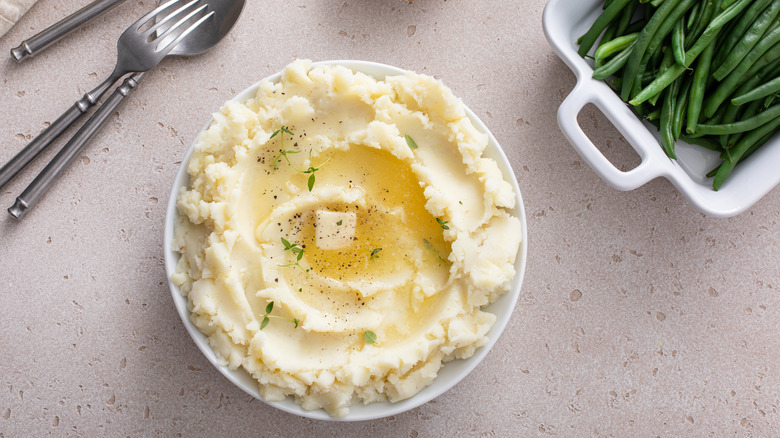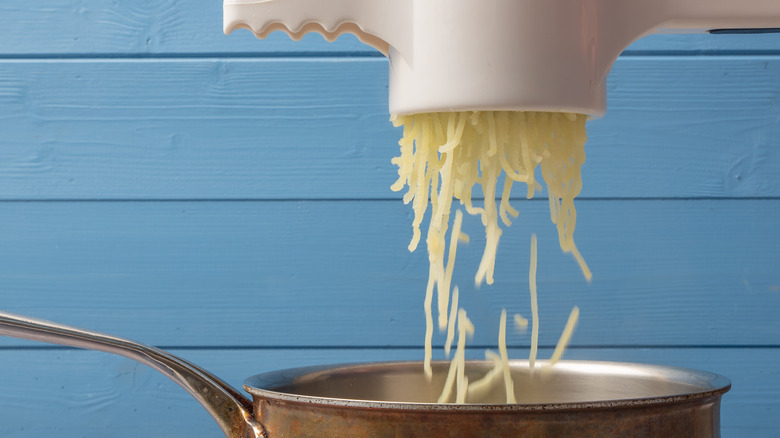The 3 Kitchen Tools You Need For Restaurant-Worthy Mashed Potatoes
We may receive a commission on purchases made from links.
There are as many theories on how to create idyllic, restaurant-quality mashed potatoes as there are types of potatoes in the world. Do you use russet potatoes or Yukon Gold spuds? Do you add your cooked potatoes to a stand mixer or mash them by hand? Do you get fancy with a secret mashed potato ingredient or two, like roasted garlic and crème fraîche, or do you stick with salt, pepper, and butter?
The secrets that make mashed potatoes taste even better, however, usually come down to technique and equipment. In fact, how you mash your potatoes is probably the most critical step to the entire process, which is why restaurant chefs, recipe developers, and home cooks alike have spent decades experimenting with different tools for the task.
The first kitchen tool to try is a potato masher. Overmixing your potatoes as you mash them or after you've added your liquid ingredients is the quickest way to make gluey, gummy mashed potatoes. That's why it's actually better to avoid using a stand mixer or a handheld mixer — their powerful beating motion breaks down the potato starches that you ought to keep intact for fluffy potatoes. A handheld potato masher, like KitchenAid's gourmet wire masher, allows you to finesse just how mixed and mashed your potatoes are. Plus, mashers come in different thicknesses depending on if you prefer chunky mashed potatoes or totally smooth ones. You can also use a burger press, like Cuisinart's cast iron tool, to smash the spuds for this step.
If you like your mashed potatoes a bit silkier but don't mind the manual labor, push your cooked, smashed spuds through a fine mesh sieve while they're super hot. You'll notice right away how luscious and lump-free your resulting mashed potatoes are. Just be warned that cleaning this tool after pressing potatoes through it can be somewhat time-consuming.
The best tool to buy for perfect mashed potatoes
You may already have a potato masher or fine mesh sieve on hand, but we're here to tell you that a potato ricer is worth the purchase. This tool is easy to use without breaking a sweat and results in gorgeously airy mashed potatoes. And, because you're not working hard to force the potatoes through the mechanism, the spuds retain all their delicious starches and strong potato-y flavor. Plus, the low-effort tool — take PriorityChef's heavy-duty potato ricer, for instance — means you can make a serious mound of mashed potatoes without needing a rest.
Because you're already working hard to avoid gluey mashed potatoes, we'd be remiss not to mention an important, often overlooked factor when making the starchy dish: Water is the enemy. Most recipes ask you to boil potato chunks until fork tender, then drain. However, we'd recommend removing them with a slotted spoon to shake off as much water as possible without losing those essential starches to the sink after the heavy pressure of draining them.
Some chefs recommend avoiding the water altogether by baking your potatoes instead of boiling them. You can roast your potatoes until tender, then cut them almost in half before flipping them over so they're skin-side up on a baking sheet. From there, you can use a potato masher or burger press to smash the potatoes into smaller pieces and easily remove their skins. After that, you're ready to push them through a ricer and continue following your favorite creamy, tangy mashed potato recipe.

